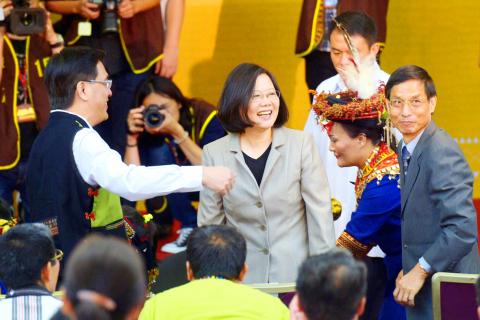President Tsai Ing-wen (蔡英文) yesterday marked Indigenous Peoples’ Day by attending the National Administration Conference of Indigenous Peoples at National Taiwan University Hospital’s International Convention Center in Taipei.
The annual meeting, organized by the Council of Indigenous Peoples, focused on Aboriginal language development.
Tsai lauded the Aboriginal Language Development Act (原住民族語言發展法), which cleared the legislative floor on May 26 and went into effect on June 14.

Photo: Chang Chia-ming, Taipei Times
Languages play a vital role in identity, Tsai said, adding that was why the government had pushed for the legislation, which lists all Aboriginal languages as national languages.
She expressed hope that the knowledge and languages of Aborigines would not be lost because of government prohibition, as was the case in the past.
Tsai said that her administration has fulfilled eight promises given to Aborigines on Aug. 1 last year: the language development act; the establishment of the Indigenous Historical Justice and Transitional Justice Committee; a review of efforts to implement the Indigenous Peoples Basic Act (原住民族基本法) and decisionmaking on the storage of nuclear waste on Orchid Island (Lanyu, 蘭嶼); the establishment of legal aid centers for Aborigines; recognition of the Pingpu people — communities who formerly resided on Taiwan’s western plains; a Cabinet report on the promotion of Aboriginal historical and transitional justice on Aug. 1 each year; and the demarcation of Aborigines’ traditional lands.

Photo: Chang Chia-ming, Taipei Times
Tsai said that her administration “has heard many different opinions,” on historical and transitional justice, which shows that “we still have a long way to go.”
Several dozen campaigners protested outside the meeting, calling for complete recognition of Aboriginal traditional territories.

Alain Robert, known as the "French Spider-Man," praised Alex Honnold as exceptionally well-prepared after the US climber completed a free solo ascent of Taipei 101 yesterday. Robert said Honnold's ascent of the 508m-tall skyscraper in just more than one-and-a-half hours without using safety ropes or equipment was a remarkable achievement. "This is my life," he said in an interview conducted in French, adding that he liked the feeling of being "on the edge of danger." The 63-year-old Frenchman climbed Taipei 101 using ropes in December 2004, taking about four hours to reach the top. On a one-to-10 scale of difficulty, Robert said Taipei 101

Taiwanese and US defense groups are collaborating to introduce deployable, semi-autonomous manufacturing systems for drones and components in a boost to the nation’s supply chain resilience. Taiwan’s G-Tech Optroelectronics Corp subsidiary GTOC and the US’ Aerkomm Inc on Friday announced an agreement with fellow US-based Firestorm Lab to adopt the latter’s xCell, a technology featuring 3D printers fitted in 6.1m container units. The systems enable aerial platforms and parts to be produced in high volumes from dispersed nodes capable of rapid redeployment, to minimize the risk of enemy strikes and to meet field requirements, they said. Firestorm chief technology officer Ian Muceus said

MORE FALL: An investigation into one of Xi’s key cronies, part of a broader ‘anti-corruption’ drive, indicates that he might have a deep distrust in the military, an expert said China’s latest military purge underscores systemic risks in its shift from collective leadership to sole rule under Chinese President Xi Jinping (習近平), and could disrupt its chain of command and military capabilities, a national security official said yesterday. If decisionmaking within the Chinese Communist Party has become “irrational” under one-man rule, the Taiwan Strait and the regional situation must be approached with extreme caution, given unforeseen risks, they added. The anonymous official made the remarks as China’s Central Military Commission Vice Chairman Zhang Youxia (張又俠) and Joint Staff Department Chief of Staff Liu Zhenli (劉振立) were reportedly being investigated for suspected “serious

American climber Alex Honnold is to attempt a free climb of Taipei 101 today at 9am, with traffic closures around the skyscraper. To accommodate the climb attempt and filming, the Taipei Department of Transportation said traffic controls would be enforced around the Taipei 101 area. If weather conditions delay the climb, the restrictions would be pushed back to tomorrow. Traffic controls would be in place today from 7am to 11am around the Taipei 101 area, the department said. Songzhi Road would be fully closed in both directions between Songlian Road and Xinyi Road Sec 5, it said, adding that bidirectional traffic controls would